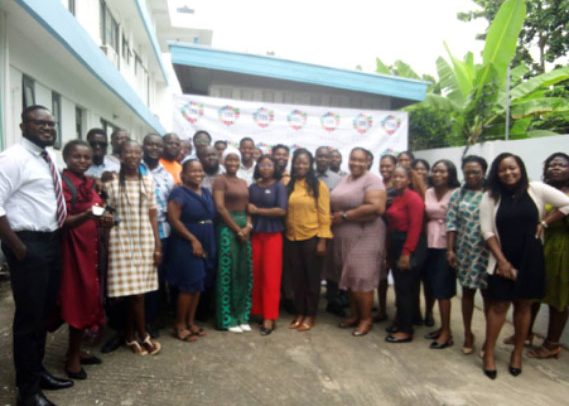Participants at the training
The Ghana Civil Society Organisations (CSOs) Platform on Sustainable Development Goals (SDGs), a platform established to foster coordinated civil society efforts towards achieving the SDGs, has organised a workshop for journalists aimed at strengthening media capacity on menstrual health reporting.
The workshop, held in Accra on May 29, 2025, sought to enhance media professionals’ skills in reporting on menstrual health issues, with a specific focus on access to affordable sanitary pads and government initiatives aimed at promoting menstrual hygiene and health.
The National Coordinator for the Ghana CSOs Platform on SDGs, Levlyn Konadu Asiedu, stated that the purpose of the workshop was to enlighten journalists and make them aware that they have a responsibility to educate the public on menstrual health, and to dispel misconceptions surrounding it.
“We organised this training so that they can better report on menstrual health management, be it menstrual hygiene, education, or advocacy or on how to create advocacy groups for menstrual health amongst young people,” she explained.
She mentioned that the workshop was not organised to imply that journalists do not perform their duties effectively, but rather to foster their growth.
“We’re not doing this because we think you’re not doing a good job. Within every organisation, there’s something known as ‘Continuous Professional Development’, so we’re doing this as a way to aid growth, so this is a form of professional development along the lines of reporting,” she said.
She encouraged parents to engage in conversations surrounding menstruation and menstrual health. She stated that young girls should not have to first find out about menstruation from their friends, but from their parents, stressing that they should know about it long before they have their first period.
“Before a girl menstruates for the first time, her parents, most especially, should have had conversations around the subject. Some parents don’t talk to their children about it, so they often find out from their friends who are also children, who may also not know much about the subject,” she stressed.
She pointed out that religious bodies, schools and other advocacy groups have been included in these conversations, but stressed that the onus lies with the parents.
The communications lead of Oxfam in Ghana, Archibald Adams, also chimed in to say that journalists are agents of change, so they can use their platforms to educate and reduce stigma surrounding periods, fuelled by negative cultural norms.
“Journalists are agents of change, they’re not just reporters, so they can use their platforms to educate and reduce the level of stigma, which is being fuelled by negative cultural norms, so that everyone can talk about menstruation,” he said.
He also expressed excitement at the government’s latest free sanitary pad initiative, and pledged their support for the initiative.
“We’re excited that the government has launched the free sanitary pad; we are pledging our support to work with the government to ensure that it can get to that girl in that rural area, to ensure that she can menstruate in dignity,” he said.
Emphasising the importance of an inclusive approach, he urged the clergy and other religious leaders, as well as schools and corporate organisations, to join the conversation, fostering a collaborative and inclusive approach to address pressing issues surrounding menstrual health.
“We need everybody to come on board, the churches, the schools, and corporate Ghana,” he said.
By Vera Owusu Sarpong


